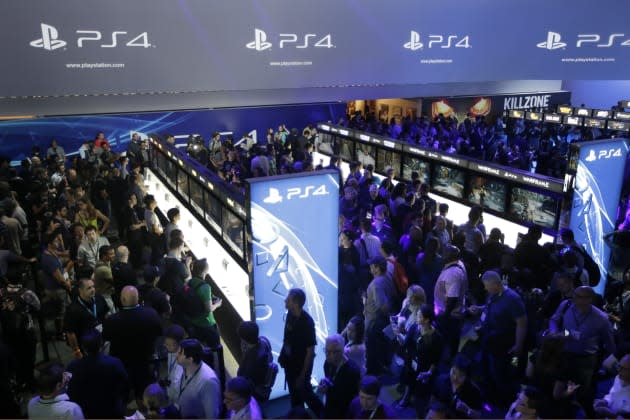What you need to know about the Electronic Entertainment Expo (E3)

Spring rains are ending; the R train tunnel is nearly through with repairs (after being ravaged by Hurricane Sandy); and we're nowhere near Engadget HQ in downtown Manhattan. Alas, it's early summer: time for the Electronic Entertainment Expo once more. The annual game industry trade event, commonly referred to as "E3," unofficially kicks off today in Los Angeles. A quartet of press conferences start at 9AM PT, with Microsoft and Sony bookending the day's proceedings. But wait -- what's all the fuss about? "What's the deal with E3?" you say in your best Jerry Seinfeld voice.
In short, E3 is a big marketing event for the game industry. In reality, E3 is much, much more than that.
WHAT IS IT?
E3 -- the so-called Electronic Entertainment Expo -- is a three-day game industry trade show in Los Angeles, California. It draws game makers, publishers, marketing and press all into the same venue, the Los Angeles Convention Center, for an annual marketing blitz aimed at showcasing the coming holiday's big games. It's where the CEOs, executives and game makers of Sony, Microsoft, Nintendo and many others make grandiose stage presentations announcing new hardware and software. It's where game consoles are announced, interviews take place and deals are brokered. It's where Nintendo of America President Reggie Fils-Aime originally said, "My body is ready," and where former PlayStation head Kaz Hirai said, "Riiiiiiiidge Racerrrr!" It's the place where many, many gaming memes originated.
To understand the event more clearly, you must first know that a tremendous portion of the game industry's money is earned during holiday sales. What's "tremendous" in this case? Try over one-third in 2013 alone. "But last year, right around the holidays, both the Xbox One and PlayStation 4 launched!" you protest. Fair point! In 2012, the number was even higher: Just shy of 40 percent of the game industry's money was earned in the holiday season (Oct. 1st through Dec. 31st). That's not an aberration; it's the standard.
As such, the game industry cares an awful lot about making a big splash with holiday plans in... June. It might sound early, but there are just four months between June and October; for many game publishers, it's the beginning of a final marketing push before a game's big holiday release.
Of course, the world of video games is wide and varied; much of what you read above applies directly to the biggies: Call of Duty, Battlefield, Madden, Halo, etc. Though smaller games have a bigger presence than ever at E3, it's still primarily a trade event aimed at showcasing blockbuster games that cost millions of dollars.
HOW DOES IT WORK?
Though the show "officially" runs from Tuesday through Thursday of whatever week it falls on (the second week of June in recent years), the show really begins on Monday. This year, Microsoft's starting the show with a press briefing at 9AM PT, followed by Electronic Arts, then Ubisoft, then Sony in the evening. None of the briefings are in the same venue, and they occasionally overlap. If you were standing outside of downtown LA's Orpheum Theater, for instance, around noon PT today, you might find an Engadget editor scurrying out ahead of the presentation ending. They're not just going to get more coffee; they're heading to the next event to hold a spot in line. Such is the first day of E3.
In the case of us, we liveblog; we interview; we run from place to place while sharing our favorite Luigi death stare GIFs along the way. Heck, last year we even did live broadcasts before and after the presentations.
E3 goes "official" on Tuesday at noon PT as the doors to West and South Hall inside the LACC open. Why noon? Well, you might be wondering why Nintendo's press conference wasn't mentioned yet. That's because, as of last year, Nintendo no longer holds a dedicated press briefing event, instead opting for a direct-to-consumers video presentation ahead of the show floor's noon opening (think: Nintendo Direct). But the long and short is this: Tuesday morning used to be Nintendo's press conference, but not anymore. It's as simple as that.
When the doors to each hall do open, swathes of attendees flood in: Approximately 50,000 people walk E3's two enormous halls over the three days it exists each year.

WHY SHOULD I CARE?
Well, for starters, because video games are rad, but you probably already know that. The actual reasons you should care about E3 are far less esoteric. Want to know what the next major steps are from the megacorporations that make your favorite games? E3 is where to find out. How about never-before-seen games? E3 is also great for that. It's also, occasionally, a venue for new hardware announcements. Both Project Natal (which became Kinect) and PlayStation Move were E3 announcements, as was Nintendo's incredibly popular 3DS handheld.
In short, regardless of the marketing-driven angle, and the spectacle of two sprawling convention halls full of multi-million dollar booths erected for just three days per year, E3 is a hugely important event for both the game industry and the people who sustain it.
Also, it's full of hilarious memes.
WANT EVEN MORE?
And who wouldn't?! Last year, Sean Buckley wrote an incredibly thorough history of E3 -- if you're into learning more about E3, that is a must-read. For the Nate Silvers in the crowd, the body that runs E3 -- the Entertainment Software Association -- releases an annual statistical study of gaming, including E3 trends (PDF). And finally, Polygon's Chris Plante made a pretty hilarious video walking through even more details about "America's biggest video game event" (he means E3).
[Image credit: AP Photo/Jae C. Hong]

